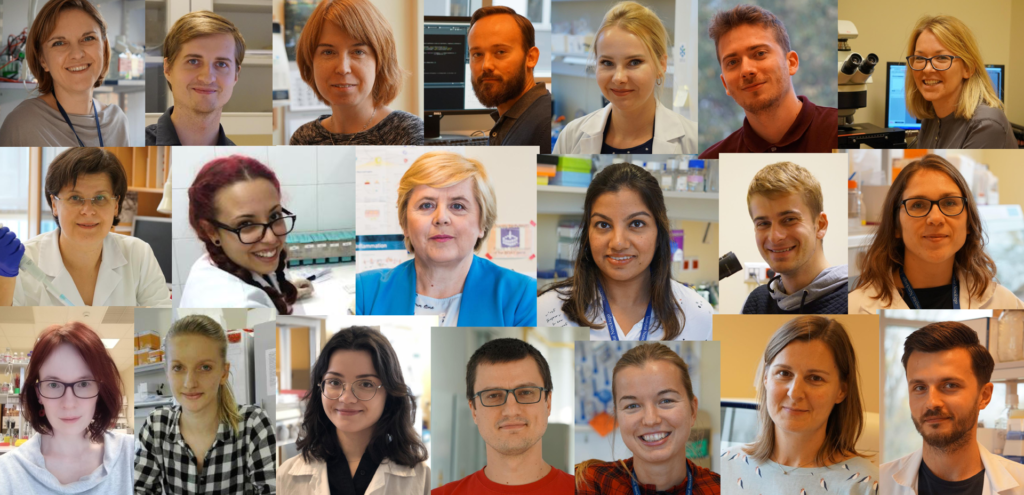- Head of laboratory
- Scientific Staff
- Technician and administration staff
- PhD Students
- Research profile
- Current research activities
- Selected publications
Head of laboratory

Research profile
We study molecular and cellular mechanisms that regulate innate immune cell recruitment into neoplastic tissue, and the subsequent regulation of those cells exert on cancer cells. We are interested in: a role of innate immune cells in regulating tissue remodeling, angiogenesis, immune suppression and cancer development, analyses of clinical samples obtained from patients with cancer, the development of novel reagents to modulate immune response in tumours. We identified several factors responsible for the protumorigenic activity of microglia and we are developing RNAi or short interfering peptide-based technologies to inhibit tumour growth. Another long-range goal of our research program is to gain mechanistic insights into the functions of histone covalent modifications and mechanisms of transcription regulation underlying pathogenesis of brain tumours. Using next generation sequencing, we search for novel genomic alterations in epigenetic enzymes, chromatin modifiers and factors influencing chromatin structure in brain tumours. Using ATAC-seq, chromatin immunoprecipitation, NGS sequencing and bioinformatics, we map open chromatin, transcription factor binding sites and epigenetic modifications in gliomas and 3-D spheres cultures enriched in cancer stem cells. Our long-term goal is to translate basic observations made in the animal models, toward rational design of novel therapeutics whose aim will be to block and/or alter rate-limiting events critical for tumor growth or recurrence in humans.
Current research activities
We study heterogeneity and roles of immune infiltrates in brain tumours and brain ischemia models using RNA sequencing and functional analyses. We dissect transcriptomic profiles and roles of selected transcription factors and epigenetic modifications in the protumorigenic reprogramming of microglia in vitro. Using ATAC-seq, chromatin immunoprecipitation, NGS sequencing and bioinformatics, we map open chromatin, DNA methylation profiles, transcription factor binding sites and epigenetic modifications in gliomas of different grades to develop brain specific gene regulatory regions. We characterize gene regulatory network operating in cancer stem cells in patient derived glioma sphere cultures. These experimental studies are conducted in parallel with evaluation of representative human cancer specimens to affirm that mechanisms revealed in the experimental setting represent fundamental features of cancer development in humans.
Current projects involve screening for epigenetic enzyme inhibitors, development of RNAi and small interfering peptide-based molecules against signalling factors driving the protumorigenic reprogramming of microglia. In collaboration with small companies we perform preclinical testing of various inhibitors targeting immune response related proteins, epigenetic enzymes, signalling molecules in rat and murine models of gliomas. As part of the Polish Glioma Network we established a biobank composed of 220 glioma DNA/RNA samples.
More information at the web site: https://kaminska-lab.nencki.edu.pl/
Selected publications
Maleszewska M, Steranka A, Smiech M, Kaza B, Pilanc P, Dabrowski M, Kaminska B. Sequential changes in histone modifications shape transcriptional responses underlying microglia polarization by glioma. Glia. 69(1):109-123, 2021.
Ellert-Miklaszewska A, Ochocka N, Maleszewska M, Ding L, Laurini E, Jiang Y, Roura AJ, Giorgio S, Gielniewski B, Pricl S, Peng L, Kaminska B. Efficient and innocuous delivery of small interfering RNA to microglia using an amphiphilic dendrimer nanovector. Nanomedicine (Lond) 14(18):2441-2458, 2019
Rajan WD, Wojtas B, Gielniewski B, Miró-Mur F, Pedragosa J, Zawadzka M, Pilanc P, Planas AM, Kaminska B. Defining molecular identity and fates of CNS-border associated macrophages after ischemic stroke in rodents and humans. Neurobiol Dis. 137:104722, 2020.
Król SK, Kaczmarczyk A, Wojnicki K, Wojtas B, Gielniewski B, Grajkowska W, Kotulska K, Szczylik C, Czepko R, Banach M, Kaspera W, Szopa W, Marchel A, Czernicki T, Kaminska B. Aberrantly Expressed RECQL4 Helicase Supports Proliferation and Drug Resistance of Human Glioma Cells and Glioma Stem Cells. Cancers (Basel). 12(10):2919, 2020.

